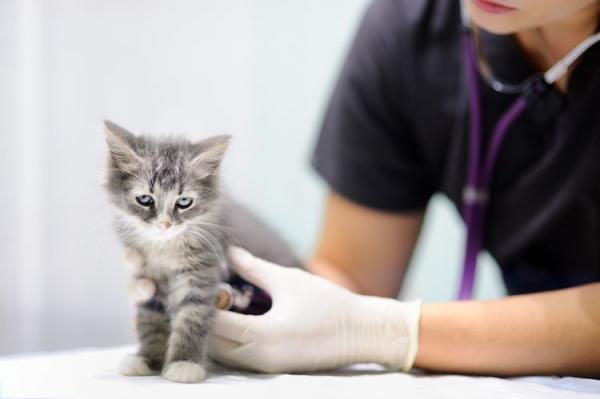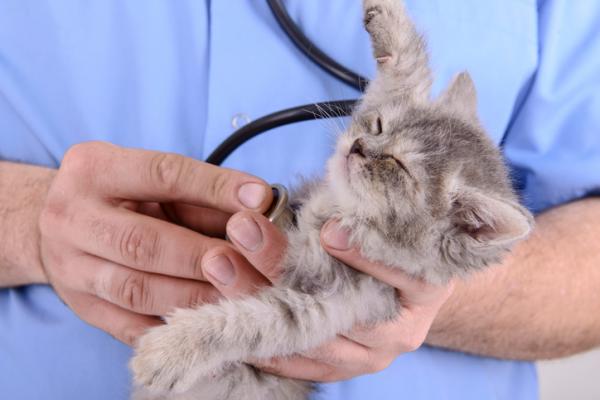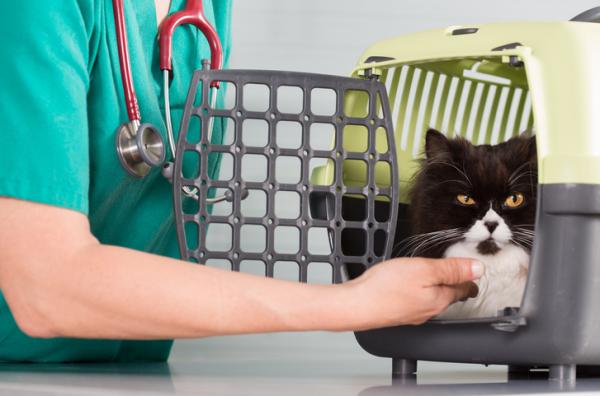When to take the cat to the veterinarian for the first time?

Adopting a kitten can be an exciting experience, especially if it’s the first time you live with one of these animals. Adoption entails different responsibilities, from providing the love you deserve, feeding and offering a space to take charge of your health.
When it comes to health, visits to the specialist are crucial, but when is it advisable to go? If you want to know when to take your cat to the veterinarian for the first time, Then read on!
First visit of the cat to the veterinarian
If you have just adopted a cat, be it adult or baby, going to the vet is one of the first things you should do. It is advisable, if you do not have other pets at home, is to wait a week for the cat to get used to your presence and feel comfortable during the visit to the doctor. If you have other animals, go as soon as possible or, otherwise, keep the feline separated from the other pets until the revision is made, since it could be a carrier of a pathology or parasite.
The first visit to the veterinarian should be done from the 7 or 8 weeks. Ideal moment to perform the first controls. At the 3 months the first vaccines are injected and the reinforcement is applied other 3 months later.
After vaccination and deworming it is advisable to visit the veterinarian each 6 or 12 months to perform a control recognition. Likewise, we must go whenever we observe abnormal symptoms.

Veterinary care of a cat
Now that you know how often you should take your cat to the veterinarian, you need to know the basic procedures that must be carried out, since all of this will help prevent and detect possible diseases in your feline.
In the first consultation, the veterinarian will consult you basic details about the cat and perform a General Review. After that, it is most likely that the feline will be dewormed. Some veterinarians perform a test before, but most recommend deworming during the first visit, especially if it is a cat that used to live on the street or that has been adopted in a shelter.
Before starting the cat vaccination calendar it is advisable to wait a few days, so that the components of these are not affected by the dewormer. The most important vaccine is trivalent feline or the triple feline, since it protects the cat against feline panleukopenia (feline distemper), rhinotracheitis and calicivirosis. Some 4 months later reinforcement of this vaccine is applied and then repeated annually.
When the cat has completed the 5 months it is also advisable to apply the vaccine against feline leukemia and the 6 months against rage. You must bear in mind that if you have adopted a stray cat and have other animals at home, it is best to ask your veterinarian to perform the tests necessary to rule out feline leukemia and rabies before putting them together in the same space.
What happens during the first visit of the cat to the veterinarian?
The first visit to the veterinarian is essential to begin to form a link between the feline and the one who will be your doctor. The first thing the professional will do is write down your pet’s data, such as name, approximate age, origin, diet or hereditary pathologies of the parents, because this way you will know if you should be aware of any disease in the future.
Afterwards, the veterinarian will proceed to carry out a general review of the feline. He will stop to check his eyes, ears, teeth and coat for external parasites or signs of injury. Auscultate your lungs and your heart, as well as weigh and measure it. If you do not know the age of your cat, with these data the veterinarian will be able to give you the approximate.
On this first visit, you will administer the dewormer and determine the best time to begin the application of the vaccines. Also, depending on the status of the feline, it may require that some additional tests be performed.
At the end of the visit, they will offer you a primer with all the medical data of your pet that will help you keep track of the preventive measures that have been applied.

When to take a cat to the vet?
Now, we have been talking about when the first visit to the veterinarian should be made and the frequency of reinforcements of the vaccines, but this does not mean that your cat should wait until the year of the vaccines is over if you observe abnormal symptomatology.
In this sense, these are some of the other reasons to go to the veterinarian:
- If you look external parasites, as fleas and ticks, in their fur, or internal parasites in their feces, as larvae.
- If you have been the victim of a hit or traumatism that hinders the act of walking or has caused a wound or a bruise.
- If you watch what happens one or two days without eating.
- If you notice that body temperature has decreased or increased abnormally.
- If you observe that urine with blood or he has trouble urinating.
- If you notice that your coat looks disheveled or has stopped grooming.
- If you have vomiting or diarrhea for more than 24 hours.
- If you think you are poisoned or poisoned.
- If your behavior changes suddenly and for no apparent reason.
Advice for the first visit to the veterinarian
Going to the veterinarian, or just leaving home, can become a traumatic experience for the cat if the necessary precautions are not taken.
In that sense, we recommend you:
- Having a transpontín for animals.
- Encourage your feline, days before, to enter transpontín on their own, either turning it into a space to play or hiding prizes in it.
- Use pheromones for cats if you get very nervous during the trip to the clinic, these should be sprayed around the traspontín.
- To coordinate an appointment with the veterinarian So the cat should spend as little time as possible in the waiting room, since the presence of other animals could make him nervous.
- Scratch the head, chin and ears to transmit peace.
- If you notice that you are nervous, address the cat with a slow and loving voice.
With these tips, the visit will be much simpler!

This article is merely informative, in .com we do not have the faculty to prescribe veterinary treatments or make any kind of diagnosis. We invite you to take your pet to the veterinarian in case of any type of condition or discomfort.
If you want to read more articles similar to When to take the cat to the veterinarian for the first time?, we recommend that you enter in our Prevention section.


